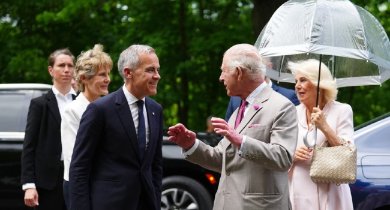
King Charles III is set to deliver a rare and historic address to open Canada’s new parliamentary session on Tuesday, as the country navigates growing political and economic threats from its southern neighbor, the United States, led by former President Donald Trump.
The speech—only the third time in Canadian history a reigning monarch has read the throne speech in person—comes at the invitation of Prime Minister Mark Carney, who has framed the royal visit as a powerful statement of Canada’s sovereignty and unity.
“This historic honour matches the weight of our times,” Carney said. The King’s presence, his first visit to Canada since his coronation, comes amid global uncertainty and rising anxiety over Trump’s rhetoric about potentially annexing Canada as the “51st state.”
King Charles, 76, who is undergoing cancer treatment, arrived in Ottawa alongside Queen Camilla for the two-day visit, which is expected to be rich in symbolism and closely watched for any subtle responses to Trump’s provocations. Although the monarch has remained silent on the former U.S. president’s comments, observers will parse his words for indirect references to Canada’s national identity and resilience.
The throne speech, to be delivered in the Senate—temporarily housed in a converted railway station due to ongoing parliamentary renovations—was drafted by the Prime Minister’s Office and outlines the government’s priorities under the Renewed Hope Agenda. While read by the King, the speech represents Carney’s vision to “build Canada strong” in the face of geopolitical volatility.
Carney, a former central banker with no prior political experience, led the Liberal Party to victory in April’s legislative elections with a platform focused almost entirely on standing up to Trump’s disruptive agenda. He has pledged a sweeping economic transformation reminiscent of post-WWII reconstruction to prepare Canada for an era of strategic independence.
Diplomatic sources indicate the speech will contain subtle but firm language reaffirming Canada’s sovereignty, a direct response to Trump’s repeated statements questioning the country’s autonomy.
“This moment is extraordinary,” said Felix Mathieu, a political science professor at the University of Quebec in Outaouais. “It’s only the third time a sovereign has delivered the throne speech in Canada, and the timing could not be more symbolic.”
The two previous instances occurred in 1957 and 1977, both delivered by Queen Elizabeth II. “What surrounds the speech is as important as the speech itself,” Mathieu added. “It’s a clear message to Donald Trump and the world that Canada is not alone.”
Thousands gathered in Ottawa on Monday to welcome the royal couple, who visited a farmer’s market, received military honors, and attended cultural events featuring Indigenous music and leaders. On Tuesday, the King and Queen will proceed to the Senate in a royal carriage escorted by 28 officers of the Royal Canadian Mounted Police’s “Musical Ride.” The ceremony will include a 21-gun salute, a fighter jet flypast, and a wreath-laying at Canada’s National War Memorial.
For many Canadians, the royal visit is more than ceremonial. “He’s here to send a message to Trump that we’re not for sale,” said Shrikant Mogulala, 32, one of the thousands lining the streets.
Retiree Dave Shaw, 60, echoed the sentiment: “It’s a great time for the King to be here—given the political climate, and what Canada stands for.”
As Canada braces for an unpredictable era in North American relations, the King’s words—however diplomatically measured—may well become a defining moment in the nation’s assertion of its place on the world stage.